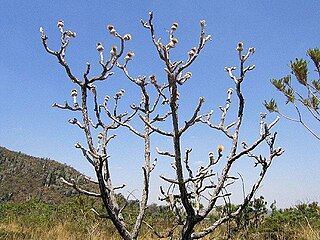
The Mimosoideae are a traditional subfamily of trees, herbs, lianas, and shrubs in the pea family (Fabaceae) that mostly grow in tropical and subtropical climates. They are typically characterized by having radially symmetric flowers, with petals that are twice divided (valvate) in bud and with numerous showy, prominent stamens.

Cassia is a genus of flowering plants in the legume family, Fabaceae, and the subfamily Caesalpinioideae. Species are known commonly as cassias. Cassia is also the English common name of some species in the genus Cinnamomum of the family Lauraceae. Species of the genera Senna and Chamaecrista were previously included in Cassia. Cassia now generally includes the largest species of the legume subtribe Cassiinae, usually mid-sized trees.

Theobroma grandiflorum, commonly known as cupuaçu, also spelled cupuassu, cupuazú, cupu assu, or copoazu, is a tropical rainforest tree related to cacao. Native and common throughout the Amazon basin, it is naturally cultivated in the jungles of north of Brazil, with the largest production in Pará, Amazonas and Amapá, Colombia, Bolivia and Peru. The pulp of the cupuaçu fruit is consumed throughout Central and South America, especially in the northern states of Brazil, and is used to make ice creams, snack bars, and other products.

Cassia fistula, commonly known as golden shower, purging cassia, Indian laburnum, or pudding-pipe tree, is a flowering plant in the family Fabaceae. The species is native to the Indian subcontinent and adjacent regions of Southeast Asia, from southern Pakistan through India and Sri Lanka to Bangladesh, Myanmar and Thailand. It is a popular ornamental plant and is also used in herbal medicine.
Terra Nostra is a Brazilian telenovela, produced and broadcast by TV Globo in 1999. The telenovela is written by Benedito Ruy Barbosa and directed by Jayme Monjardim.

Calliandra is a genus of flowering plants in the pea family, Fabaceae, in the mimosoid clade of the subfamily Caesalpinioideae. It contains about 140 species that are native to tropical and subtropical regions of the Americas.

Peltogyne, commonly known as purpleheart, violet wood, amaranth and other local names is a genus of 23 species of flowering plants in the family Fabaceae; native to tropical rainforests of Central and South America; from Guerrero, Mexico, through Central America, and as far as south-eastern Brazil.

Senna, the sennas, is a large genus of flowering plants in the legume family. This diverse genus is native throughout the tropics, with a small number of species in temperate regions. The number of species is estimated to be from about 260 to 350. The type species for the genus is Senna alexandrina. About 50 species of Senna are known in cultivation.

Gunnera manicata, known as Brazilian giant-rhubarb or giant rhubarb, is a species of flowering plant in the family Gunneraceae from the coastal Serra do Mar Mountains of Santa Catarina, Parana and Rio Grande do Sul States, Brazil.

Senna artemisioides, the wormwood senna, is a species of flowering plant in the pea family Fabaceae. It is endemic to Australia, where it is found in all mainland states and territories. Other common names include silver senna, silver cassia or feathery cassia - although "cassia" generally refers to the largest-growing Cassiinae. Some of its distinct subspecies also have common names of their own.

Cássia Kis is a Brazilian actress. Formerly known as Cássia Kiss, she included her husband's family name in her stage name between 2010 and 2015 and changed the middle pseudonym from Kiss to Kis. Currently, her stage name is Cássia Kis.

Wunderlichia is a genus of Brazilian trees in the family Asteraceae.

Senna occidentalis [Indian vernacular name Usaya ki Fali] is a pantropical plant species, native to the Americas. The species was formerly placed in the genus Cassia.

Muita Calma Nessa Hora 2 is a 2014 Brazilian comedy film directed by Felipe Joffily, written by Bruno Mazzeo and Lusa Silvestre, and starring Mazzeo, Marcelo Adnet, Fernanda Souza and Andréia Horta. It is a sequel to the 2010 film Muita Calma Nessa Hora.

Cassia leptophylla is a tropical tree species in the genus Cassia, which is indigenous to Brazil. It is named gold medallion tree and has yellow flowers that bloom intermittently throughout the year, spawning seedpods that are rectangular in cross section and rattle festively. It is recognized by its thin green foliage with glossy green pinnate leaflets. The fruit is a long thin seedpod with four sides.
Sétimo Sentido is a Brazilian telenovela produced and broadcast by TV Globo. It premiered on 29 March 1982 and ended on 8 October 1982, with a total of 167 episodes. It's the twenty eighth "novela das oito" to be aired on the timeslot. It is created and written by Janete Clair and directed by Roberto Talma.
Juacas is a Brazilian television series created by Carina Schulze and produced by Chatrone and Cinefilm and broadcast by Disney Channel Brazil. It is the second original national series produced by Disney Channel in Brazil, after Que Talento!. The story combines comedy, action, and romance. The series premiered on July 3, 2017 in Latin America and Italy, through closed channels on Disney Channel and Disney XD. The series was shown from October 21, 2017 to January 14, 2018, in the children's programming block Mundo Disney, on SBT. In Portugal, it debuted on May 14, 2018 through the closed channel SIC K. Shortly after the end of the series, it was made available on the service of Claro and Net, Now. On August 4, 2018, the series was made available on Netflix.

Campomanesia adamantium, commonly known as gabiroba, guavira, or guabiroba do campo, is a short shrub-like plant that grows no taller than 1.5 meters on average It is natively found in the central part of South America, in Paraguay and Brazil. The plant produces small yellow-green edible fruits
Inga striata is a perennial tree species and is a member of the family Fabaceae. This species occurs in countries like Bolivia, Brazil, Colombia, Ecuador, Guyana, Peru, Suriname and the territory of French Guiana.














